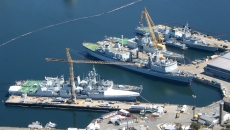To help keep people safe and re-establish the movement of critical goods and services following severe flooding and landslides, the Province is taking temporary measures to ensure fuel (gas and diesel) is prioritized for essential vehicles, while keeping it available to British Columbians.
Measures to restrict non-essential travel to and from impacted areas are also being introduced.
“We are asking people to limit their fuel consumption and vehicle travel at this time and are putting in place orders under the provincial state of emergency to support this,” said Mike Farnworth, Minister of Public Safety and Solicitor General. “These steps will keep commercial traffic moving, stabilize our supply chains and make sure everyone gets home safely. We are asking people not to travel through severely affected areas – for their own well-being, but also to make sure the fuel we do have goes toward the services people need in this time of crisis.”
Farnworth has issued two new orders using the extraordinary powers of the Emergency Program Act. The first brings in a temporary order to ensure fuel remains available for essential vehicles in affected areas of the province.
This order, effective immediately, until Dec. 1, 2021, applies to all fuel suppliers in the Lower Mainland-to-Hope region, the Sea-to-Sky region, Sunshine Coast, the Gulf Islands and Vancouver Island.
Under this order, essential vehicles will have unrestricted access to fuel as required, using predominately commercial trucking gas stations (cardlock gas stations). A full list of these essential vehicles is available in the backgrounder.
Non-essential vehicles, including the general public, will still have access to fuel available through retail gas stations. People will be limited to 30 litres per trip to the gas station.
The Province will be working with gas retailers and distributors to implement this order to make sure people are not exceeding their allotted limit per trip. As part of this order, gas retailers will be required to ensure remaining gasoline reserves last until Dec. 1, 2021. Anyone who is abusive, threatening or belligerent to gas station workers can be subject to a fine under the order.
“When our province is faced with an emergency, British Columbians step up,” Farnworth said. “We have a steady supply of gas to support all our essential vehicles and we will get through these restrictions together by staying calm, only buying what we need and looking out for each other. These measures are necessary during temporary shortages as work is under way to re-establish B.C.’s fuel supply.”
Under the order, retail gas stations and wholesale distributors will be prohibited from profit-margin price gouging and people will be prohibited from buying gas for the purpose of reselling it.
These restrictions will ensure a steady fuel supply to British Columbians, while efforts are undertaken to fix damage to roadways, establish alternative access to fuel through new routes, and re-establishing the flow of fuel through the Transmountain Pipeline that has been offline as a result of the recent weather events.
The order does not affect natural gas or heating oil used to heat homes.
The second order prohibits non-essential travel along severely affected highways:
- Highway 99: from the junction of Highway 99 and Lillooet River Road to the BC Hydro Seton Lake Campsite access in Lillooet. Only passenger vehicles and commercial vehicles up to 14,500 kilograms will be permitted.
- Highway 3: from the junction of Highway 5 and Highway 3 in Hope to the west entrance to Princeton from Highway 3.
- Highway 7: from the junction of Highway 7 and Highway 9 in Agassiz to the junction of Highway 7 and Highway 1 in Hope.
This order will be in effect starting today as these highways start to reopen. It applies to non-essential travel along specific sections of highways between the Lower Mainland and Interior of British Columbia. There are circumstances where travel is essential and permitted, specifically for the movement of any goods that are necessary for the health, safety and well-being of British Columbians. (A full list follows in a backgrounder.) As the backlog of essential traffic clears, restrictions on essential travel can be eased.
These measures are enacted under the provincial state of emergency, using the extraordinary powers of the Emergency Program Act. The act allows the minister to implement all procedures the minister considers necessary to prevent, respond to or alleviate the effects of an emergency, including controlling or prohibiting travel to or from any area of British Columbia.






